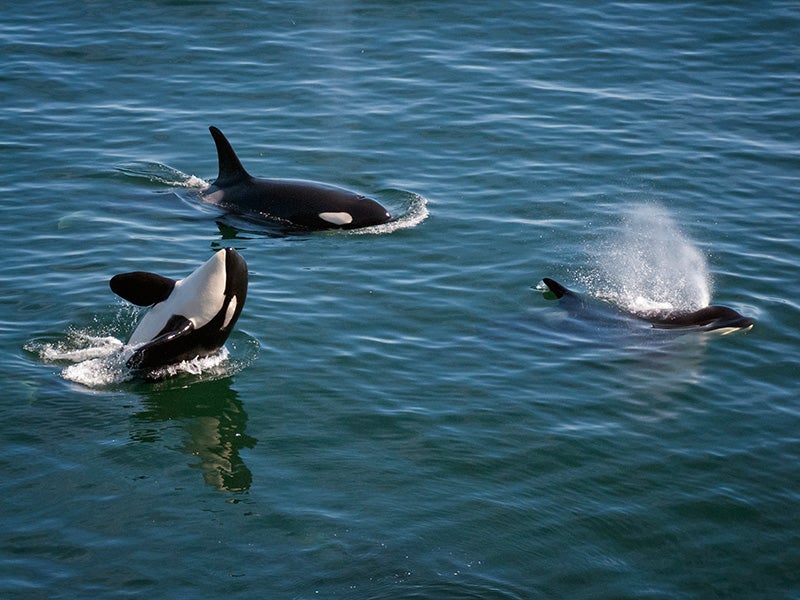Court Ruling Moves Orcas Closer to Protection from Oil Tankers
Judge finds Coast Guard’s effort to dismiss the case “misunderstands the nature of the violation and the underlying intent of the ESA”
Contact
Endangered Southern Resident Killer Whales (SRKWs) are one step closer to protection from oil tankers and other shipping traffic in the Salish Sea, thanks to a decision late Wednesday in U.S. District Court in Seattle.
The Trans Mountain project will add hundreds more oil tankers annually to the already-crowded waters of the Salish Sea.
The ruling involves a case filed in April 2017 by Earthjustice, on behalf of the Tulalip Tribes and the Suquamish Tribe. The Tribes sued the U.S. Coast Guard, charging that the agency did not comply with the Endangered Species Act when it adopted its traffic separation schemes governing the shipping lanes for marine vessels in Salish Sea waters—putting the remaining members of three SRKW pods in greater danger of injury or death.
The Coast Guard had asked the Court to dismiss the case on a technicality. On Wednesday, the Court denied that request, allowing the lawsuit to move forward. In the opinion, U.S. District Judge Marsha J. Pechman noted that “the Coast Guard does not deny that they violated the ESA” and found that the agency’s effort to dismiss the case “misunderstands the nature of the violation and the underlying intent of the ESA.”
Background:
The Coast Guard is required to consult with the National Marine Fisheries Service to ensure that traffic separation schemes regulations won’t jeopardize ESA-listed species or adversely modify their critical habitat. The Coast Guard failed to consult with NMFS, and as a result has not adopted any measures to protect the orcas—from speed limits to traffic or routing schemes, to designating any areas off-limits to marine-vessel traffic.
To the Tribes, this is particularly alarming as Canada moves ahead with plans to enlarge the Trans Mountain Pipeline. Houston-based Kinder Morgan, which operates the pipeline from the Alberta Tar Sands to Canada’s west coast, plans to triple its capacity, which would result in 400 more oil tankers annually in the Salish Sea.
Chris Jordan-Bloch / Earthjustice
Chairman Leonard Forsman (left) and Kassia Smith and Shaylene Jefferson of the Suquamish Tribe pour water on the banks of the Fraser River during a ceremony in 2014 signifying the unity of the water. Learn more.
“The court’s ruling reaffirms our responsibility to protect resident orcas from the disastrous effects of increased oil tanker traffic—whether by overall impacts from dozens of small spills, or the high probability of a catastrophic major spill,” said Affiliated Tribes of Northwest Indians President and Suquamish Tribal Chairman Leonard Forsman. “It is our sacred duty to protect them, our treaty fishing activities and our ancient way of life in the Salish Sea.”
“As our trustee, we expect the Coast Guard and other federal agencies to take our treaty rights and responsibilities as seriously as we do,” said Tulalip Tribes Chair Marie Zacuse. “The blackfish and other species that live in our lands and waters are not just resources to be used. They are our relatives. We have an inherent obligation to ensure that they are taken care of, and that our children and grandchildren will never know a world without them. These species are one of the cornerstones of our identity. If they are lost, it will be a cultural genocide for our people.”
“The law is clear, and action is needed now,” said Earthjustice attorney Steve Mashuda. “Years have already gone by without much-needed protection for the orcas and other marine life from the chronic harm caused by the growing volume of shipping traffic. With the added threat of 400 more oil tankers per year transiting their home waters, our Southern Residents cannot afford delay.”
The Southern Resident Killer Whales were first protected as endangered in 2005. With the deaths of seven whales within the last year, there are only 76 remaining. Common-sense rules to minimize the harms and risks from tanker and ship traffic are long overdue—and today’s decision brings the agencies charged with this responsibility one step closer to finally fulfilling it.

Additional Resources
About Earthjustice
Earthjustice is the premier nonprofit environmental law organization. We wield the power of law and the strength of partnership to protect people's health, to preserve magnificent places and wildlife, to advance clean energy, and to combat climate change. We are here because the earth needs a good lawyer.